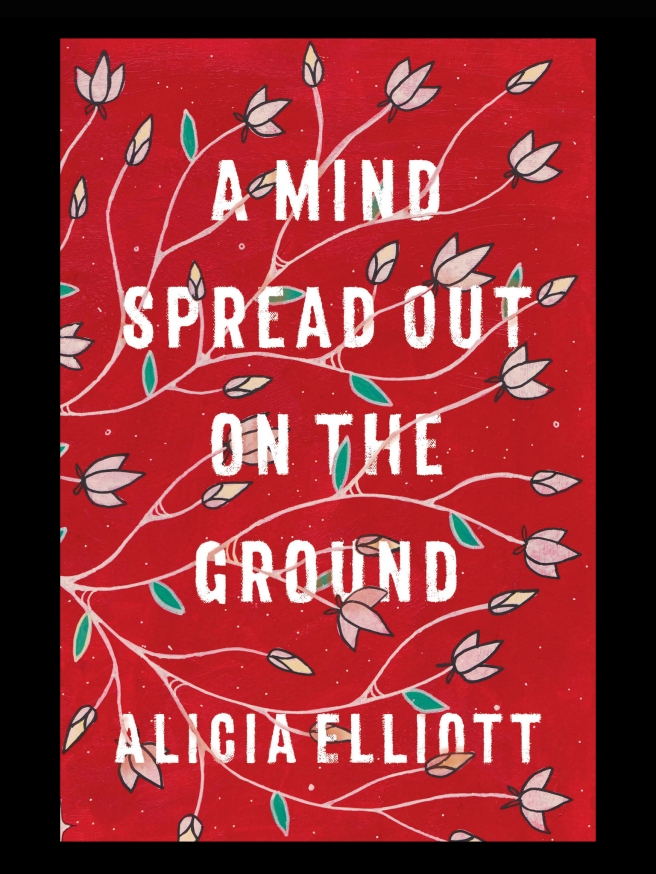Title: A Mind Spread Out on the Ground, by Alicia Elliott
Genre: Non-fiction, essay collection, memoir
Bought or borrowed? Borrowed as an ebook from Overdrive, using Libby.
Why did you pick this up? On my ongoing mission to read more from diverse authors, I was happy to pick this up after seeing it recommended by friends and influencers alike. I put my name on the waitlist after seeing Melissa Fabello recommend it; every time since that I have visited a book shop I’ve been tempted to buy a copy — and I think it’s going to go on my “to buy, to have” list right away too.

Summary:
(From the jacket/description)
“A bold and profound meditation on trauma, legacy, oppression and racism in North America from award-winning Haudenosaunee writer Alicia Elliott.
In an urgent and visceral work that asks essential questions about the treatment of Native people in North America while drawing on intimate details of her own life and experience with intergenerational trauma, Alicia Elliott offers indispensable insight into the ongoing legacy of colonialism. She engages with such wide-ranging topics as race, parenthood, love, mental illness, poverty, sexual assault, gentrification, writing and representation, and in the process makes connections between both large and small between past and present, the personal and political — from overcoming a years-long battle with head lice to the way Native writers are treated within the Canadian literary industry; her unplanned teenage pregnancy to the history of dark matter and how it relates to racism in the court system; her childhood diet of Kraft Dinner to how systemic oppression is directly linked to health problems in Native communities.
With deep consideration and searing prose, Elliott provides a candid look at our past, an illuminating portrait of our present, and a powerful tool for a better future.”
Thoughts, Feelings:
Elliott’s writing is beautiful. It’s stirring, it’s jarring. She is direct and poetic, and I wanted so much to savour this book as I read it (difficult when the hold list is literally months long). It was challenging, as a settler, to read, and for that reason I think it’s so important.
In particular, “Extraction Mentalities” sat with me. The mentality of extraction is a term I’d never encountered before this, and it’s been on my mind almost constantly since finishing it. She calls this “a participatory essay,” “a conversation I’m trusting you to finish”: “The way it will work is this: every so often I will stop this essay to ask you questions. I’ll leave space for you to answer. Do with that space whatever you will. Even blank spaces speak volumes.” And this invitation to participate in the essay made me wonder about the book as an object — what it might be like to possess a copy. Would I actually write in the blanks offered after Elliott’s questions? Would it feel too shameful? Vulnerable? How is that complicated by books as public objects, ie. as belonging to libraries, having many hands to pass through? What might it be like to read this in a group, and have to face the hard answers to the questions she poses in this essay?
I don’t exactly know what else I can say about this collection that isn’t already said in the summary. I have been sitting on writing this review because I haven’t been able to figure out what to write. All I know is that I have questions — questions for myself and for others, allies and nay-sayers of Indigenous rights activists alike. A lot of questions, in a good way. I feel challenged in a lot of my thinking after reading this book.
I implore you though: pick this up. Read even just one of the essays, and I dare you not to visit the rest.
Key Quotes
“I don’t believe you necessarily have to be part of a community to take their concerns about representation seriously.” – ‘Sontag, in Snapshots: Reflecting on “In Plato’s Cave”‘ (n.p.)
“My hesitation to be labelled as a “Native writer” isn’t a hesitation to be labelled as such by other Native people. … Being labelled as a “Native writer” by non-Native people however, is more often than not an act of literary colonialism, showing paternalism, ownership and a desire to keep us inside a neatly labelled box where they deem us a non-threat. A continuation of a fairy tale.” – ‘Not Your Noble Savage’ (n.p.)
“This seems to be Canada’s preferred image of Indigenous peoples. Not the modern Native girl in a sweatshirt and jeans trying to figure out how she fits in “Reconciliation© Canada.” No. They want the “genuine artifact”: the stoic Indian man decked out in beads and leather, who has not one ounce of white blood because that would taint his authenticity. … (Although, as recent events have shown, should the genuine artifact be unavailable, Canada will happily accept a handsome, agreeable white dude with tenuous Indigenous “roots” as a substitute.)” – ‘Not Your Noble Savage’ (n.p.)
Reread-ability: 10/10 would gladly revisit again and again.
Recommended to: Everyone. But since that’s a cop-out, I guess I’ll be more specific: everyone you know who likes reading, who is looking to expand their world view, who wants to learn and read more diverse authors, and especially people who are still subscribing to the “Canadian literary canon” (so I’m looking at anyone who jumped at the chance to get At*ood’s new book when it came out based on her fame, because HOO BOY, there should be more thought there).